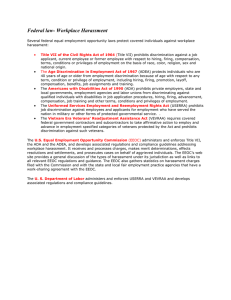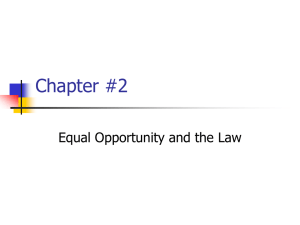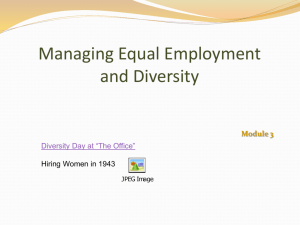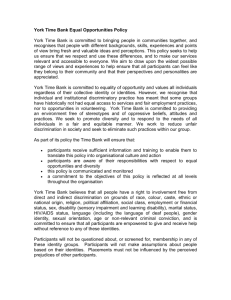EEOC SUES TWO INDIANA EMPLOYERS FOR RACE HARASSMENT
advertisement
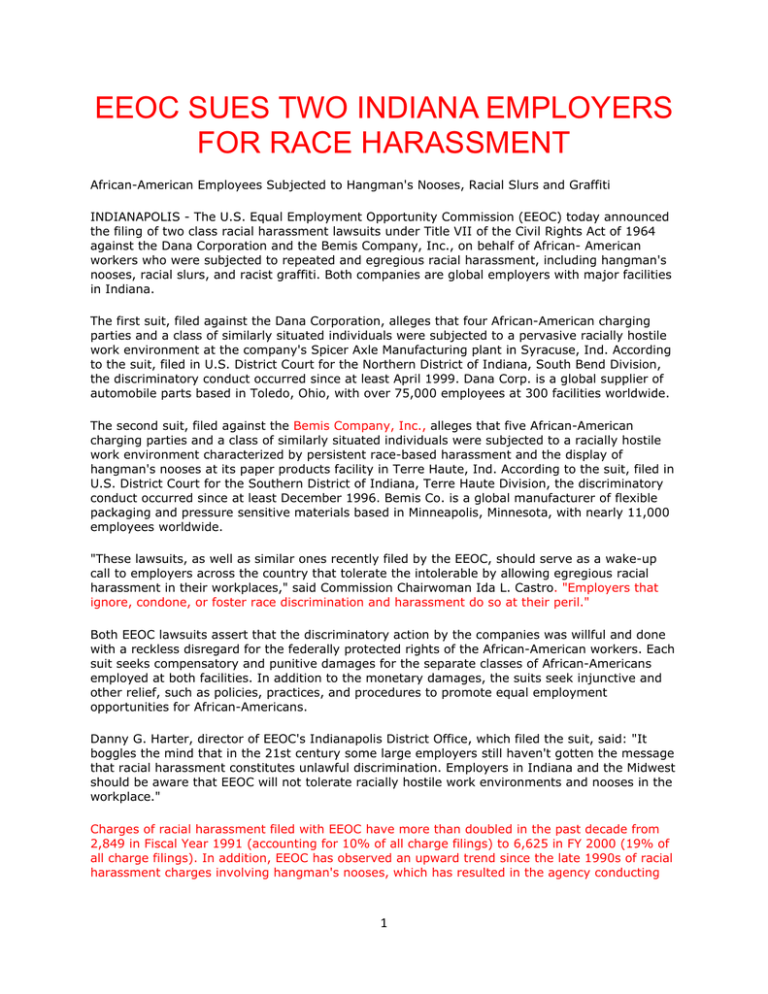
EEOC SUES TWO INDIANA EMPLOYERS FOR RACE HARASSMENT African-American Employees Subjected to Hangman's Nooses, Racial Slurs and Graffiti INDIANAPOLIS - The U.S. Equal Employment Opportunity Commission (EEOC) today announced the filing of two class racial harassment lawsuits under Title VII of the Civil Rights Act of 1964 against the Dana Corporation and the Bemis Company, Inc., on behalf of African- American workers who were subjected to repeated and egregious racial harassment, including hangman's nooses, racial slurs, and racist graffiti. Both companies are global employers with major facilities in Indiana. The first suit, filed against the Dana Corporation, alleges that four African-American charging parties and a class of similarly situated individuals were subjected to a pervasive racially hostile work environment at the company's Spicer Axle Manufacturing plant in Syracuse, Ind. According to the suit, filed in U.S. District Court for the Northern District of Indiana, South Bend Division, the discriminatory conduct occurred since at least April 1999. Dana Corp. is a global supplier of automobile parts based in Toledo, Ohio, with over 75,000 employees at 300 facilities worldwide. The second suit, filed against the Bemis Company, Inc., alleges that five African-American charging parties and a class of similarly situated individuals were subjected to a racially hostile work environment characterized by persistent race-based harassment and the display of hangman's nooses at its paper products facility in Terre Haute, Ind. According to the suit, filed in U.S. District Court for the Southern District of Indiana, Terre Haute Division, the discriminatory conduct occurred since at least December 1996. Bemis Co. is a global manufacturer of flexible packaging and pressure sensitive materials based in Minneapolis, Minnesota, with nearly 11,000 employees worldwide. "These lawsuits, as well as similar ones recently filed by the EEOC, should serve as a wake-up call to employers across the country that tolerate the intolerable by allowing egregious racial harassment in their workplaces," said Commission Chairwoman Ida L. Castro. "Employers that ignore, condone, or foster race discrimination and harassment do so at their peril." Both EEOC lawsuits assert that the discriminatory action by the companies was willful and done with a reckless disregard for the federally protected rights of the African-American workers. Each suit seeks compensatory and punitive damages for the separate classes of African-Americans employed at both facilities. In addition to the monetary damages, the suits seek injunctive and other relief, such as policies, practices, and procedures to promote equal employment opportunities for African-Americans. Danny G. Harter, director of EEOC's Indianapolis District Office, which filed the suit, said: "It boggles the mind that in the 21st century some large employers still haven't gotten the message that racial harassment constitutes unlawful discrimination. Employers in Indiana and the Midwest should be aware that EEOC will not tolerate racially hostile work environments and nooses in the workplace." Charges of racial harassment filed with EEOC have more than doubled in the past decade from 2,849 in Fiscal Year 1991 (accounting for 10% of all charge filings) to 6,625 in FY 2000 (19% of all charge filings). In addition, EEOC has observed an upward trend since the late 1990s of racial harassment charges involving hangman's nooses, which has resulted in the agency conducting 1 more investigations and filings more lawsuits nationwide. Since 1998, EEOC has sued more than 20 employers for racial harassment involving nooses and similar egregious conduct. In addition to enforcing Title VII of the Civil Rights Act of 1964, which prohibits employment discrimination based on race, color, religion, sex or national origin, EEOC enforces the Equal Pay Act; prohibitions against discrimination affecting individuals with disabilities in the federal sector; sections of the Civil Rights Act of 1991, the Americans with Disabilities Act, which prohibits discrimination against people with disabilities in the private sector, state and local governments; and the Age Discrimination in Employment Act. A settlement provided $245,000 to 22 claimants, an injunction against race discrimination and retaliation, and the deposit of $55,000 in an interest-bearing account to be used for rewards for information regarding future acts of racially-motivated vandalism or racial harassment. EEOC v. Bemis Company, Inc. (S.D. Ind. Sept. 24, 2004). 2
